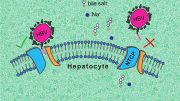
Researchers have identified a genetic cause for a rare neurological disorder characterized by developmental delay and ataxia, a loss of coordination.
In a paper published today in Nature Communications, an international group of collaborators led by researchers at UPMC Children’s Hospital of Pittsburgh have identified a genetic cause of a rare neurological disorder marked by developmental delay and loss of coordination, or ataxia.
The disorder, scientists found, is caused by mutations in a protein called GEMIN5 — one of the key building blocks of a protein complex that controls RNA metabolism in neurons. No mutations in GEMIN5 were previously linked to any genetic disease.
“It’s just like building a house,” said senior author Udai Pandey, Ph.D., associate professor of pediatrics, human genetics, and neurology at the University of Pittsburgh School of Medicine. “You take out the most important brick at the base and the whole building falls apart.”

Associate professor of pediatrics, human genetics, and neurology, University of Pittsburgh School of Medicine. Credit: UPMC
GEMIN5 is part of a protein complex that regulates a slew of important cellular processes, including development of specialized outgrowths from nerve cells called dendrites and axons. Interestingly, mutations in another key protein of the complex, named survival motor neuron protein, cause a different devastating disorder — spinal muscular atrophy.
To gather material for the study, Pittsburgh researchers contacted pediatricians, geneticists, and neurologists from all over the globe, eventually collecting data from 30 patient families in 12 different countries.
Because isolating live neurons from people isn’t possible, researchers had to come up with another way of getting samples for future testing. They collected blood samples from pediatric patients who were referred to neurogenetic clinics with undiagnosed neurological symptoms. Blood samples were then processed to isolate cells that, with careful tinkering in the lab, were reprogrammed into neurons.
After comparing genetic material of reprogrammed neurons from sick children with that of unaffected relatives, scientists linked neurologic manifestations of the disease to 26 mutations in the GEMIN5 gene that cause damage to the structure of the protein.

Assistant professor of pediatrics, Pitt School of Medicine, neurologist at UPMC Children’s Hospital. Credit: UPMC
“Children came into the clinic with non-specific symptoms, such as developmental delay and abnormal gait. Their doctors ran all the possible tests, including assessing a child’s metabolic function, to no avail — their conditions had no easy explanation,” said Deepa Rajan, M.D., assistant professor of pediatrics, Pitt School of Medicine, neurologist at UPMC Children’s Hospital and a co-first author of the study. “It was not until we did an extensive genome analysis that we found that these patients had mutations in the GEMIN5 gene.”
“Many genetic disorders seem individually rare, but collectively they are relatively common,” added Rajan, who also is director of the Neurogenetics Clinic at UPMC Children’s Hospital. “We now are able to harness next-generation technology to help diagnose previously undiagnosed children, and each new gene discovery is the start of the journey to understanding each of these diseases better.”
Additional experiments linked damage to GEMIN5 protein to disease manifestations more definitively. Scientists found that depleting an analog of human neuronal GEMIN5 protein in fruit flies was deadly if it happened in early stages of the fly’s life cycle, or drastically delayed its development if such disruption happened later.
“The most exciting part of being a researcher is working on a project that directly helps families,” said Pandey. “We are hopeful that because of our study, neurologists will now consider testing for GEMIN5 mutations and that labs will include GEMIN5 in their testing for ataxic disorders. Genetic diseases are challenging to identify and treat, but if we find a cure, it will make a massive difference in someone’s life.”
Reference: “Loss of function mutations in GEMIN5 cause a neurodevelopmental disorder” by Sukhleen Kour, Deepa S. Rajan, Tyler R. Fortuna, Eric N. Anderson, Caroline Ward, Youngha Lee, Sangmoon Lee, Yong Beom Shin, Jong-Hee Chae, Murim Choi, Karine Siquier, Vincent Cantagrel, Jeanne Amiel, Elliot S. Stolerman, Sarah S. Barnett, Margot A. Cousin, Diana Castro, Kimberly McDonald, Brian Kirmse, Andrea H. Nemeth, Dhivyaa Rajasundaram, A. Micheil Innes, Danielle Lynch, Patrick Frosk, Abigail Collins, Melissa Gibbons, Michele Yang, Isabelle Desguerre, Nathalie Boddaert, Cyril Gitiaux, Siri Lynne Rydning, Kaja K. Selmer, Roser Urreizti, Alberto Garcia-Oguiza, Andrés Nascimento Osorio, Edgard Verdura, Aurora Pujol, Hannah R. McCurry, John E. Landers, Sameer Agnihotri, E. Corina Andriescu, Shade B. Moody, Chanika Phornphutkul, Maria J. Guillen Sacoto, Amber Begtrup, Henry Houlden, Janbernd Kirschner, David Schorling, Sabine Rudnik-Schöneborn, Tim M. Strom, Steffen Leiz, Kali Juliette, Randal Richardson, Ying Yang, Yuehua Zhang, Minghui Wang, Jia Wang, Xiaodong Wang, Konrad Platzer, Sandra Donkervoort, Carsten G. Bönnemann, Matias Wagner, Mahmoud Y. Issa, Hasnaa M. Elbendary, Valentina Stanley, Reza Maroofian, Joseph G. Gleeson, Maha S. Zaki, Jan Senderek and Udai Bhan Pandey, 5 May 2021, Nature Communications.
DOI: 10.1038/s41467-021-22627-w
Other authors on the manuscript include Sukhleen Kour, Ph.D., Tyler Fortuna, Ph.D., Eric Anderson, Ph.D., Dhivyaa Rajasundaram, Ph.D., and Caroline Ward, all of Pitt, among 70 total authors.
This work was supported by a University of Pittsburgh Children’s Neuroscience Institute research grant.









Be the first to comment on "Rare Genetic Neurological Disease Caused by Mutations in Protein That Controls RNA Metabolism"